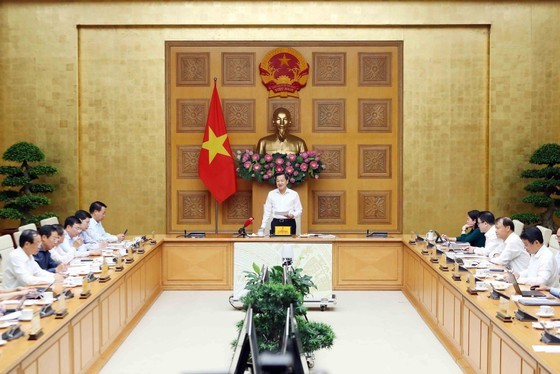 |
At the conference |
Deputy Prime Minister Le Minh Khai yesterday chaired a meeting of the Price Management Steering Committee on the results of price management work in the first nine months of 2023, and orientation for the remaining months of 2023.
The Ministry of Finance's report said that in the first 9 months of 2023, domestic market prices are quite stable, inflation is under control and in a downward trend. Sales of essential goods do not fluctuate abnormally while the supply is adequate. Prices and quantity of the goods in the market are following a gradual downward trajectory of the Steering Committee.
Based on the goal of controlling inflation for the year at 4.5 percent, synthesizing information and updating trend forecasts of essential commodities in 2023, the Ministry of Planning and Investment’s and the State Bank’s inflationary and economic outlook in 2023, the Ministry of Finance updated two inflation scenarios.
In the Ministry’s scenario 1, the average Consumer Price Index (CPI) in 2023 is highly likely to increase by about 3.2 percent compared to 2022 while in scenario 2, the average CPI in 2023 will increase by about 3.6 percent compared to 2022.
The Ministry of Finance presumed that the average CPI in 2023 will increase in the range of 3.2 percent-3.6 percent while the General Statistics Office predicted the average CPI in the range of 3.3 percent-3.6 percent. The State Bank also foresaw that average inflation in 2023 will increase by about 3.4 percent.
At the meeting, ministries and agencies said that without unusual fluctuations, controlling inflation according to the target of below 4.5 percent is feasible until now.
Deputy Minister of Planning and Investment Tran Quoc Phuong said that when the general CPI index is controlled at a low level, ministries and agencies need to be more proactive in adjusting the prices of subsidized goods or ongoing public services following the set roadmap.
It is projected that price management and administration will be under greater pressure in 2024, due to the impact of implementing the wage policy reform roadmap according to Resolution No. 27-NQ/TW and price adjustment of some goods and services such as healthcare, education, electricity prices; therefore, ministries and agencies need to carefully assess the impact to propose appropriate adjustments.
Addressing the conference, Deputy Prime Minister Le Minh Khai emphasized that in the difficult context, the price level of domestic goods remains stable, and up to now, it is possible to achieve the goals of price management and inflation management assigned by the National Assembly.
The Deputy Prime Minister requested the Ministry of Finance to carefully review and evaluate the implementation of policies on exemption, reduction, extension, and postponement of taxes, fees, charges, and land rent, especially with some large taxes that affect state budget collection while determining to achieve the target of estimates.
The Deputy Prime Minister requested ministries, agencies and localities to continue implementing appropriate price management measures for a number of essential goods, greatly impacting the consumer price index, people's lives and production activities and businesses such as petroleum, liquefied petroleum gas, electricity, transportation services, construction materials, agricultural supplies, medical services, education, food, and foodstuffs.
Regarding price management for the remaining months of 2023, the Deputy Prime Minister noted the prices of gasoline and food products because Russia and Saudi Arabia have been cutting the supply so some major countries’ petroleum reserves are likely to drop which could cause world petroleum prices to reverse and increase in the last months of the year.
Besides, prices of food products, rice for export and food security will fluctuate. Therefore, it is necessary to continue to closely monitor the world situation for having accurate evaluation of the impacts to proactively find timely and appropriate solutions, and keep the inflation index according to the target.
The State Bank was assigned to continue having its eyes on global development while keeping the exchange rate and the currency value stable to curb its impact on the macro-economy.
Moreover, ministries, agencies and localities proactively carry out state management of commodities and closely monitor supply and demand developments, and market prices of commodities under their management to have appropriate management measures.
Furthermore, they must prepare adequate sources of goods to have solutions to produce, reserve, regulate, ensure supply, and stabilize market prices for the end of the year and the coming Lunar New Year, especially for essential goods.
Deputy Prime Minister Le Minh Khai also instructed prices of several important goods and services including electricity prices. Specifically, he urged the Ministry of Industry and Trade to work with the Committee for Management of State Capital at Enterprises to direct Vietnam Electricity to submit a price adjustment plan before October 25 in accordance with the Government and the Prime Minister’s.
In respect of petroleum products, the Ministry of Industry and Trade ought to continue implementing solutions to ensure supply for the country's distribution system. Last but not least, it must be ready to promptly handle price changes when the market experiences fluctuation.
The Ministry of Health was assigned to submit its opinions on adjusting medical service prices in October 2023 to the Government as well as consider issuance of a circular on medical service prices.
Deputy Prime Minister Khai requested related ministries and agencies to closely monitor developments of other essential goods and services to have reports and solutions.
























